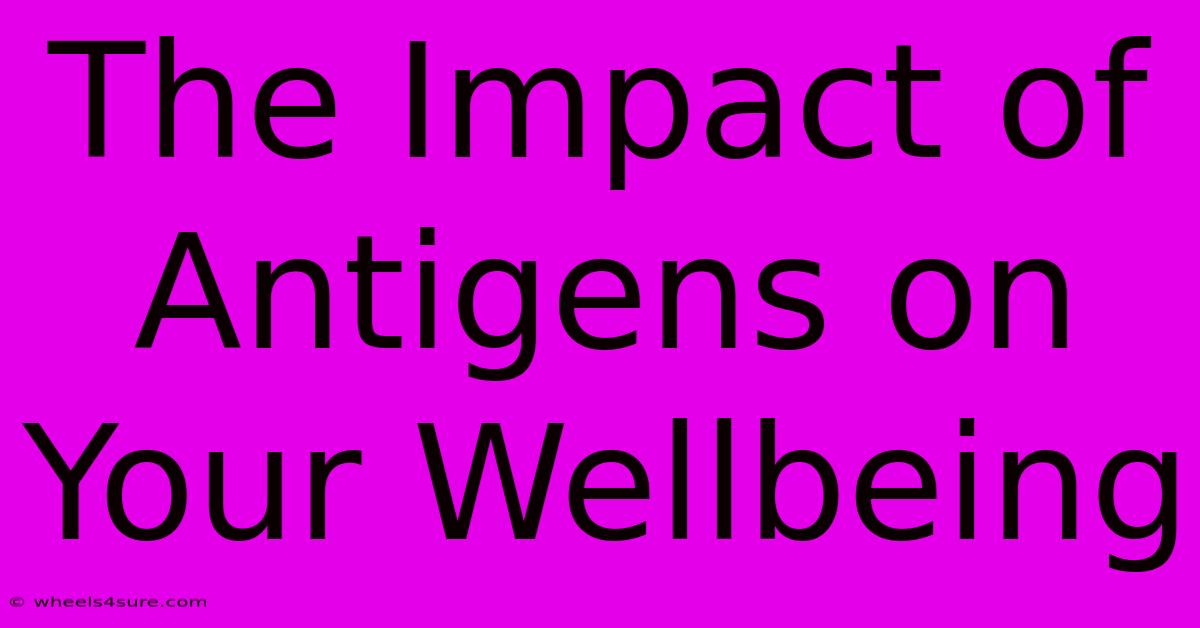The Impact Of Antigens On Your Wellbeing

Table of Contents
The Impact of Antigens on Your Wellbeing
Our bodies are in a constant state of negotiation, a delicate dance between ourselves and the outside world. A key player in this ongoing interaction? Antigens. Understanding their role is crucial to understanding our overall wellbeing. This article delves into the impact of antigens on your health, exploring both their beneficial and detrimental effects.
What are Antigens?
Simply put, antigens are substances that trigger an immune response. These can be anything from bacteria and viruses to pollen, food particles, and even our own cells (in cases of autoimmune disorders). Your immune system recognizes these antigens as "foreign invaders" and mounts a defense to neutralize or eliminate them. This response involves a complex interplay of cells and molecules, leading to a variety of outcomes, some positive and some negative for our wellbeing.
Types of Antigens and Their Sources:
Antigens come in various forms and from numerous sources:
- Pathogenic Antigens: These are antigens from disease-causing organisms like bacteria (e.g., Streptococcus pneumoniae), viruses (e.g., influenza virus), fungi, and parasites. These are the antigens our immune system is most focused on fighting off to maintain our health.
- Environmental Antigens: These are found in our surroundings and can trigger allergic reactions. Examples include pollen, dust mites, pet dander, and certain foods.
- Self-Antigens: In autoimmune diseases, the immune system mistakenly identifies our own body's cells as foreign antigens, attacking them and causing damage to various organs and tissues. This highlights the crucial role of immune system regulation in maintaining wellbeing.
- Tumor Antigens: Cancer cells often express unique antigens that can be targeted by the immune system. Immunotherapy leverages this by boosting the immune response against these tumor-specific antigens.
The Beneficial Impact of Antigens:
While often associated with illness, antigens play a vital role in maintaining our wellbeing:
- Immune System Development: Exposure to a diverse range of antigens, especially in early childhood, is crucial for the development and maturation of our immune system. This "training" allows the immune system to learn to distinguish between harmless and harmful substances, improving our overall immune response.
- Immune Memory: When we encounter an antigen, our immune system develops "memory cells." These cells "remember" the specific antigen and can mount a faster and more effective response upon subsequent exposure, providing long-lasting protection (like after vaccination). This is a fundamental aspect of immunity and contributes significantly to our wellbeing.
- Disease Prevention: Vaccines work by introducing weakened or inactive antigens into the body. This stimulates an immune response without causing disease, creating immune memory and protecting us from future infections. This is a cornerstone of public health and is critical for global wellbeing.
The Detrimental Impact of Antigens:
Despite their benefits, antigens can also negatively impact our wellbeing:
- Allergies: Exposure to environmental antigens can trigger allergic reactions, ranging from mild symptoms like sneezing and itching to severe life-threatening conditions like anaphylaxis. These reactions are caused by an overactive immune response to generally harmless substances, significantly impacting quality of life.
- Autoimmune Diseases: Autoimmune diseases occur when the immune system attacks the body's own tissues. This leads to a wide range of debilitating conditions such as rheumatoid arthritis, lupus, and type 1 diabetes, drastically affecting wellbeing.
- Infections: Pathogenic antigens cause infectious diseases, leading to a range of symptoms depending on the pathogen and the individual's immune response. These illnesses can range from mild to severe and even life-threatening, significantly impacting wellbeing and potentially leading to long-term health issues.
Maintaining Wellbeing in the Face of Antigens:
Maintaining a strong and balanced immune system is key to mitigating the negative impacts of antigens. This can be achieved through:
- Healthy Lifestyle: A balanced diet, regular exercise, sufficient sleep, and stress management are crucial for immune system function.
- Vaccination: Vaccines provide crucial protection against many infectious diseases.
- Hygiene Practices: Good hygiene, including handwashing, can help reduce exposure to pathogenic antigens.
- Allergy Management: Identifying and avoiding allergens, along with appropriate medical treatment, can help manage allergic reactions.
In Conclusion:
Antigens are integral to our immune system's function, impacting our wellbeing both positively and negatively. Understanding their role allows us to adopt strategies to strengthen our immune defenses, minimize risks associated with harmful antigens, and maintain optimal health. A proactive approach to health, incorporating lifestyle modifications and preventative measures, is vital for navigating the complex relationship between our bodies and the antigens we encounter daily.

Thank you for visiting our website wich cover about The Impact Of Antigens On Your Wellbeing. We hope the information provided has been useful to you. Feel free to contact us if you have any questions or need further assistance. See you next time and dont miss to bookmark.
Featured Posts
-
Piyush Guptas Net Worth A Source Of Motivation
Apr 06, 2025
-
Jurnee Smolletts Net Worth Fact Vs Fiction
Apr 06, 2025
-
Santner Age Cultivating Gratitude
Apr 06, 2025
-
Ksi His Net Worth And Philanthropic Efforts
Apr 06, 2025
-
Kikwete Age Building A Sustainable Future
Apr 06, 2025
